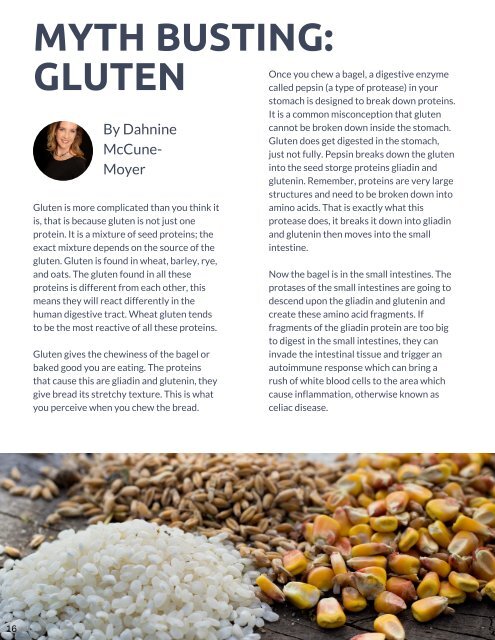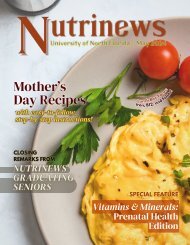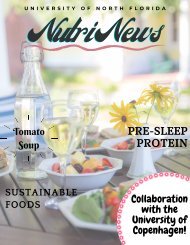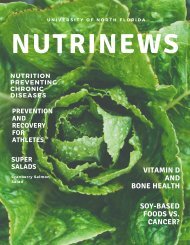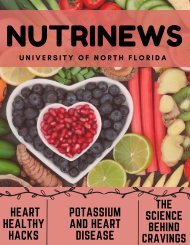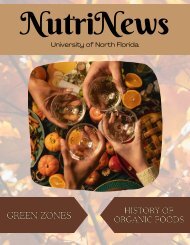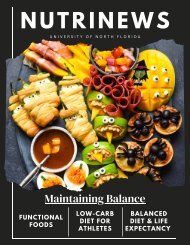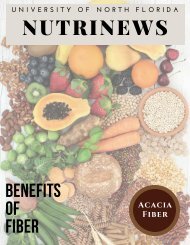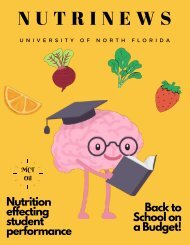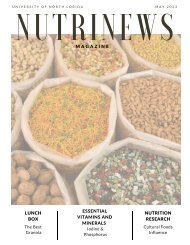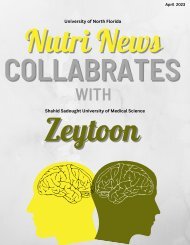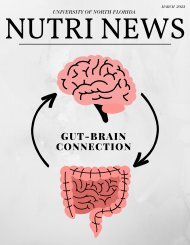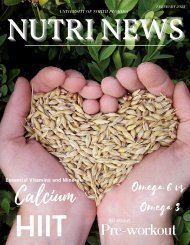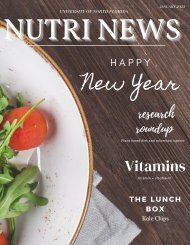Nutri News December 2022
This month theme is the colors of health!! You will find articles about: • The importance of a colorful diet “Eat the Rainbow” • How is biotechnology is affecting our foods • What is intuitive eating and how it can help you recognize and be more sensitive to your body’s hunger and satiety signals • Delicious and colorful vegan recipes in the lunch box! • What’s the hype behind Phytochemicals, are they really that important? Let me answer that for you, YESSS!! • Have you seen those foods that claim to be gluten “free” and have wonder what gluten is and if you should care whether your food is gluten free, check our myth busting article to find out more • The holidays are coming and with that all the delicious foods we like to indulge on, but beware “SALT” check out our international collaboration about salt and salt substitutes • “Ditch the dietary supplements and eat whole foods instead” What are the effects of supplement vs whole foods in sports performance • Have you been feeling tired and down recently? you might have a vitamin D deficiency, check out our essential guide to vitamins and minerals article to learn more about the role of magnesium and vitamin D in our mood, sleep, and overall health This month’s student spotlight is Lindsey Cedeno Ortiz, check what she has to say in page 12! For this month interview, we have Dr. Catherine Christie, recipient of the Academy of Nutrition and Dietetics Medallion Award. This is an interview you won’t want to miss!!!! If you are looking to make an impact on campus as well as in the community, look for the fliers highlighting volunteer opportunities. These amazing programs are always looking for more volunteers. It is amazing the difference we can make when we all work together for a better and healthier tomorrow. Happy reading!
This month theme is the colors of health!!
You will find articles about:
• The importance of a colorful diet “Eat the Rainbow”
• How is biotechnology is affecting our foods
• What is intuitive eating and how it can help you recognize and be more sensitive to your body’s hunger and satiety signals
• Delicious and colorful vegan recipes in the lunch box!
• What’s the hype behind Phytochemicals, are they really that important? Let me answer that for you, YESSS!!
• Have you seen those foods that claim to be gluten “free” and have wonder what gluten is and if you should care whether your food is gluten free, check our myth busting article to find out more
• The holidays are coming and with that all the delicious foods we like to indulge on, but beware “SALT” check out our international collaboration about salt and salt substitutes
• “Ditch the dietary supplements and eat whole foods instead” What are the effects of supplement vs whole foods in sports performance
• Have you been feeling tired and down recently? you might have a vitamin D deficiency, check out our essential guide to vitamins and minerals article to learn more about the role of magnesium and vitamin D in our mood, sleep, and overall health
This month’s student spotlight is Lindsey Cedeno Ortiz, check what she has to say in page 12!
For this month interview, we have Dr. Catherine Christie, recipient of the Academy of Nutrition and Dietetics Medallion Award. This is an interview you won’t want to miss!!!!
If you are looking to make an impact on campus as well as in the community, look for the fliers highlighting volunteer opportunities. These amazing programs are always looking for more volunteers. It is amazing the difference we can make when we all work together for a better and healthier tomorrow.
Happy reading!
Create successful ePaper yourself
Turn your PDF publications into a flip-book with our unique Google optimized e-Paper software.
MYTH BUSTING:<br />
GLUTEN<br />
By Dahnine<br />
McCune-<br />
Moyer<br />
Gluten is more complicated than you think it<br />
is, that is because gluten is not just one<br />
protein. It is a mixture of seed proteins; the<br />
exact mixture depends on the source of the<br />
gluten. Gluten is found in wheat, barley, rye,<br />
and oats. The gluten found in all these<br />
proteins is different from each other, this<br />
means they will react differently in the<br />
human digestive tract. Wheat gluten tends<br />
to be the most reactive of all these proteins.<br />
Gluten gives the chewiness of the bagel or<br />
baked good you are eating. The proteins<br />
that cause this are gliadin and glutenin, they<br />
give bread its stretchy texture. This is what<br />
you perceive when you chew the bread.<br />
Once you chew a bagel, a digestive enzyme<br />
called pepsin (a type of protease) in your<br />
stomach is designed to break down proteins.<br />
It is a common misconception that gluten<br />
cannot be broken down inside the stomach.<br />
Gluten does get digested in the stomach,<br />
just not fully. Pepsin breaks down the gluten<br />
into the seed storge proteins gliadin and<br />
glutenin. Remember, proteins are very large<br />
structures and need to be broken down into<br />
amino acids. That is exactly what this<br />
protease does, it breaks it down into gliadin<br />
and glutenin then moves into the small<br />
intestine.<br />
Now the bagel is in the small intestines. The<br />
protases of the small intestines are going to<br />
descend upon the gliadin and glutenin and<br />
create these amino acid fragments. If<br />
fragments of the gliadin protein are too big<br />
to digest in the small intestines, they can<br />
invade the intestinal tissue and trigger an<br />
autoimmune response which can bring a<br />
rush of white blood cells to the area which<br />
cause inflammation, otherwise known as<br />
celiac disease.<br />
16


